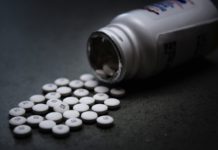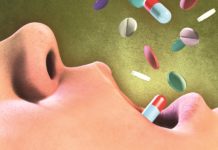Opioids May Cause Depression and Worsen Chronic Pain
“Converging lines of evidence now suggest that depression—a common comorbidity in the setting of chronic pain—may in some patients represent an unrecognized yet potentially reversible harm of opioid therapy.”
Legal Journal Says Antidepressants Can Cause Violence and Suicide
Antidepressants have been reported to cause a state called “akathisia,” where people feel extremely agitated and restless and may become preoccupied with thoughts of...
Benzodiazepine & SSRI Addiction and Withdrawal
The May issue of Addiction includes a review of pharmacological and phenomenological issues around benzodiazepine (BZD) and SSRI discontinuation. Definitions, perceptions and management of the...
One in Five Children Treated with ADHD Stimulants Also Getting Antipsychotics
About one in five children on Medicaid who are being given long-acting stimulants for ADHD are also being given antipsychotics, often for unapproved conditions.
“Barry Takes Center Stage for World Benzo Day Launch”
Mad In America contributor and prescription drug addiction reformer Barry Haslam has “taken his fight to the world stage by helping create an international...
Lower Education Linked to Higher Antipsychotic Use in Swedish Elderly
Elderly people in Sweden are five times more likely to be taking antipsychotics if they have a diagnosis of dementia, according to research published in Acta Psychiatrica Scandinavica. And among those people with dementia, the lower their education the higher the likelihood they’re taking antipsychotics.
“Medication for Schizophrenia: Less is More?”
Neuroskeptic weighs in on the controversy over the lack of antipsychotic dose data in the RAISE study and the misleading media coverage. He points out that one of the treatment interventions was a computerized medication management system called COMPASS, which recommends doctors use lower doses than they otherwise might.
Differentiation of SSRI and Benzo Dependence/Withdrawal “Not Rational”
Researchers from the Cochrane Center and University of Copenhagen in Denmark, publishing in the May issue of Addiction, "explore the rationale for claiming that...
Discontinuing Psychotropics Reduces Falls in Elderly
Australian researchers look at the literature on the effect of psychotropics on falls in the elderly; largest effect of any randomized trial was achieved...
Researchers Address Dangers of Polypharmacy and Inappropriate Medication Use
A new special issue brings together articles exploring the harmful effects of simultaneous multiple medication use.
NIMH Info for Parents on “ADHD” Misleading, Researchers Say
A new analysis of the information that the National Institute of Mental Health (NIMH) publishes for parents about attention deficit hyperactivity disorder (ADHD) concludes that the children’s experiences and contexts are ignored and that medication is presented, misleadingly, as the only solution supported by research evidence.
Duty to Warn – 14 Lies That Our Psychiatry Professors in Medical School Taught...
Revealing the false information provided about psychiatry should cause any thinking person, patient, thought-leader or politician to wonder: “how many otherwise normal or potentially curable people over the last half century of psych drug propaganda have actually been mis-labeled as mentally ill (and then mis-treated) and sent down the convoluted path of therapeutic misadventures – heading toward oblivion?”
Did Psychiatric Drugs Play a Role in the Prom Day Killer’s Violent Behavior?
The alleged “Prom day” killer, Christopher Plaskon, is a snap shot of the future result of Connecticut’s increased mental health services. The 17 year-old's defense apparently will be that his “mental health” caused his murderous actions – not the dangerous psychiatric drugs he obviously has been taking for some time.
Consumer Reports Recommends Against Antipsychotics for Depression
Consumer Reports recommends against antipsychotic "augmentation therapy" for depression. The consumer watchdog magazine finds that the unproven efficacy, harmful side effects, availability of alternatives,...
How to Get Away with Academic Misconduct at the University of Minnesota
In early 2009, antipsychotic fraud was making headlines. Eli Lilly had announced in January that it would plead guilty to charges that it had...
ADHD Drug Studies Find Little Change in Academic Performance
According to the Wall Street Journal's, story on a June study of 4000 Qubequois students, "a growing body of research finds that in the...
Women on SSRIs Less Likely To Breastfeed
In a prospective cohort study of 466 pregnant women over 10 years, researchers at the California Teratogen Information Service found that women exposed to...
“Why Are Our Toddlers Being Prescribed Antipsychotic Drugs?”
The Melbourne Herald Sun reports that "The prescription of some atypical antipsychotics has more than doubled . . . Psychiatrist Dr George Halasz who has been vocal about...
Members of FDA Advisory Committee Offer Perspectives on Flibanserin Approval in JAMA
In the September issue of The Journal of the American Medical Association (JAMA) three FDA advisory committee members describe the convergence of factors that made the committee’s recommendation to approve flibanserin especially challenging and politically charged.
Prenatal Valproate Exposure Linked with ADHD Diagnosis in Children
Children who were exposed to anti-seizure drug valproate in utero were 48% more likely to develop ADHD, according to a new study.
Stimulants, But Not Cannabis, Predict Readmission for Psychosis
Prior admissions with stimulant disorder, but not a prior cannabis disorder diagnosis, are a negative prognostic sign in first-episode psychosis according to new research...
Short-Term SSRI Use Associated With Gastrointestinal Bleeding
Researchers find, through a review of records from the Taiwanese National Health Insurance Database from 1998 to 2009, that short-term (7-28 day) use of...
Eli Lilly To Freeze Base Pay in 2012
Citing financial pressure from the loss of its patent on Zyprexa, Eli Lilly announced that it will freeze base pay for most of its...
Exposure to Antidepressants in the Womb Linked to Autistic Behavior in Mice
Researchers experimenting on mice found that exposure to fluoxetine (Prozac) in utero resulted in behaviors considered in animal studies to be analogous to autism in humans.
Finding and Funding Our Way, Outside the System
There's a growing (and soon to be quickly growing) group of us who are not therapists or psychiatrists but who offer “coaching,” connection and support. We offer this support to those coming off psychiatric drugs, or who would like to, or are opting to not go on in the first place but are facing pressure to. Most of us are psychiatric survivors so a lot of our knowledge and information is from firsthand experience. Others may have never been on psychiatric drugs but know a lot about the ins and outs of withdrawal through close association with those who have.













